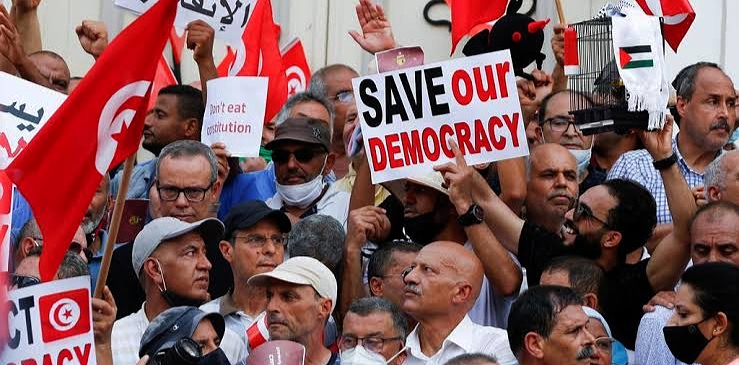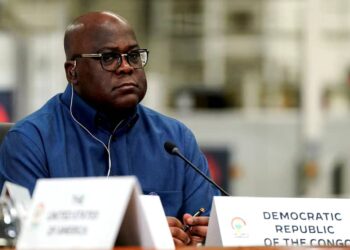By John Ikani
Thousands of Tunisians protested on Sunday against President Kais Saied, demanding a return to the normal democratic order and rejecting his replacement of the independent electoral commission with one he named himself.
Saied has entrenched his one-man rule since seizing executive power last summer, dismissing parliament, moving to rule by decree and saying he will replace the democratic constitution through a referendum.
The demonstrators were captured in photos waving Tunisian flags and loaves of bread to express their displeasure against rising food prices.
“The people want democracy” and “Saied has led the country to starvation” were two slogans chanted by the protesters at the main rally in central Tunis, the biggest against him in months, a week after a far smaller demonstration in his support.
“It has become clear that the street supports a return to the democratic path,” said Samira Chaouachi, the deputy leader of the dissolved Parliament who like Saied’s other opponents accuses him of a coup.
Saied denies a coup, saying his intervention was legal and necessary to save Tunisia from years of political paralysis and economic stagnation at the hands of a corrupt, self-serving elite who had taken control of government.
Meanwhile, Tunisia’s economy and public finances are in crisis and the Government is in talks with the International Monetary Fund for a rescue package amid widespread poverty and hardship.
Saied’s moves have thrust Tunisia into its biggest political crisis since the 2011 revolution that introduced democracy and triggered the ‘Arab Spring’, threatening the rights and freedoms won 11 years ago.
He has replaced a judicial council that guaranteed judges’ independence as well as the independent electoral commission, casting doubt on the integrity of both the legal process and of elections.
The 2014 constitution was the result of months of intense negotiation among a broad array of political parties and civil society bodies including the powerful UGTT labour union, which has more than a million members.
Saied has rejected calls for a similar inclusive dialogue, saying those who opposed his moves should be barred from discussion on Tunisia’s future as he prepares for a referendum on his new constitution.
A co-ordinator from the Citizens against the Coup coalition – one of the protest organisers – told the state broadcaster that they rejected the country’s “new constitution” that was “drawn up unilaterally” by Mr Saied.
Islamist Ennahda Movement official Ali al-Arid told the channel that protests would continue in the form of sit-ins, marches and hunger strikes.



































